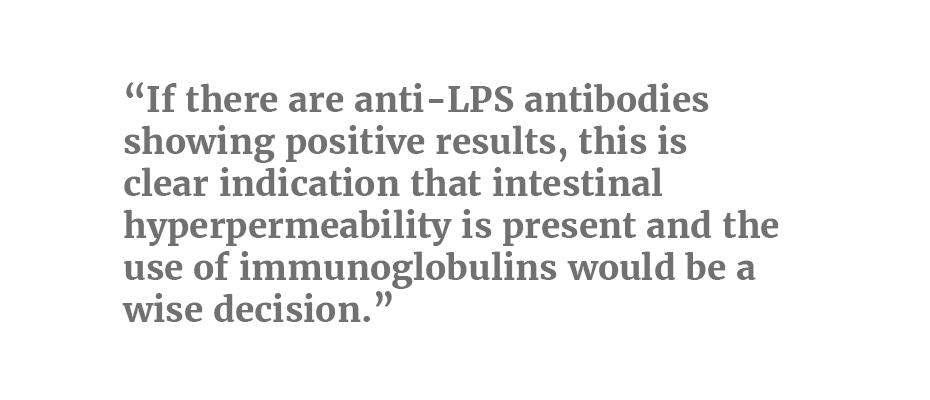In the world of functional medicine, testing has come a long way. Not only do we have more types of tests that can be performed, but the analysis has evolved, too. For example, the idea of zonulin’s role in intestinal permeability was just discovered by Dr. Fasano and his team in 2000! That is fairly new when you think about it, and yet, there are a handful of testing opportunities to choose from on the market today. While this is exciting, it also means we fall behind as busy practitioners trying to decide what all these new markers mean for our treatment strategies. I want to help you decide what lab markers suggest your patients could benefit from the use of immunoglobulins in his or her treatment plan (Click here for more info on oral immunoglobulins). Let’s explore the two most common testing markers that many practitioners use: comprehensive stool analysis with zonulin levels and serum LPS antibodies.
Comprehensive Stool Analysis with Zonulin Levels
A comprehensive stool analysis provides an array of information about what is happening within the gastrointestinal tract, including a list of bacteria. That list doesn’t often indicate the Gram stain classification, but if you do quick search for examples of Gram-negative bacteria (E. coli, Klebsiella pneumoniae, Campylobacter, H. pylori, etc.), you can easily cross-reference them. These Gram-negative bacteria are hidden clinical gems because they contain lipopolysaccharides (LPS) in their outer membrane, and we are well-aware of how potent LPS are at eliciting an immune response and driving inflammation.
If a patient has been chronically ill, diagnosed with autoimmunity, been on medications, or has elevated zonulin levels, you can assume some level of intestinal hyperpermeability. In the presence of permeability, LPS from Gram-negative bacteria are difficult to control and can wreak havoc on immune function. The presence of both Gram-negative bacteria and intestinal permeability should indicate the use of immunoglobulins shown to bind to LPS in the gut lumen. If you can successfully sequester LPS before it passes through the gut barrier, then you can expect your patients to improve more quickly and have better clinical outcomes in their treatment plans for gastrointestinal and immune issues.
Serum LPS Antibodies
Testing markers via stool don’t necessarily tell us the immune system is responding the same way serum does. To truly evaluate whether the immune system has reacted to something, it is necessary to test for serum markers. A new testing marker is serum levels of anti-LPS IgG, IgM and IgA. Antibodies to LPS found in serum is a clear indication that not only did LPS found in the cell wall of Gram-negative bacteria move from the intestinal lumen into the blood stream, but that the immune system recognized it and created a response. This is also why serum LPS levels are becoming the gold standard for intestinal permeability and resulting immune activation.
Since this is fairly new, there are only a few labs running serum anti-LPS levels. If there are anti-LPS antibodies showing positive results, this is clear indication that intestinal hyperpermeability is present and the use of immunoglobulins would be
a wise decision. LPS is a pathogen-associated molecular pattern (PAMP) that antibodies recognize and bind to, so using oral immunoglobulins proven to have binding capacity to LPS can ensure it is sequestered in the lumen and eliminated via peristalsis
in the presence of permeability. Once again, if you can sequester LPS before it passes through the gut barrier, then you can eliminate the most potent trigger for immune activation and the subsequent inflammatory cascade.  While these test markers are not the only testing options for the presence of an immune response to pathogens, they are the most commonly overlooked by clinicians when planning clinical intervention. Oral immunoglobulin
use is a therapeutic intervention that could be your most valuable weapon when trying to eliminate triggers, decrease inflammatory pathways, and restore self-tolerance. These objectives are important in any chronic disease that has intestinal permeability
in the clinical picture, including autoimmunity, neuroinflammation, metabolic endotoxemia, etc. Removal of immune triggers will allow patients to heal more quickly, and the testing markers to find these triggers are right under your nose!
While these test markers are not the only testing options for the presence of an immune response to pathogens, they are the most commonly overlooked by clinicians when planning clinical intervention. Oral immunoglobulin
use is a therapeutic intervention that could be your most valuable weapon when trying to eliminate triggers, decrease inflammatory pathways, and restore self-tolerance. These objectives are important in any chronic disease that has intestinal permeability
in the clinical picture, including autoimmunity, neuroinflammation, metabolic endotoxemia, etc. Removal of immune triggers will allow patients to heal more quickly, and the testing markers to find these triggers are right under your nose!
ANGELA LUCTERHAND, DC

Dr. Angela Lucterhand received her doctorate in chiropractic from Palmer College of Chiropractic in Davenport, Iowa. While there, she was a graduate teaching assistant for courses including Anatomy and Physiology, Histology, the Central Nervous System, and Spinal Anatomy. She received her Bachelor of Arts at Indiana University.
Her interest in basic health care led her to become a Health Education Specialist with the Peace Corps, where she served in Mali, West Africa. Dr. Lucterhand loves teaching and was an adjunct professor for Anatomy and Physiology at Ivy Tech. Her passion in practice is addressing the root causes of disease and emphasizing the impact of lifestyle medicine.
Dr. Lucterhand practices chiropractic and functional medicine in Elkhart, Indiana, and currently holds the position of Immune Foundations Brand Manager at the Lifestyle Matrix Resource Center.




